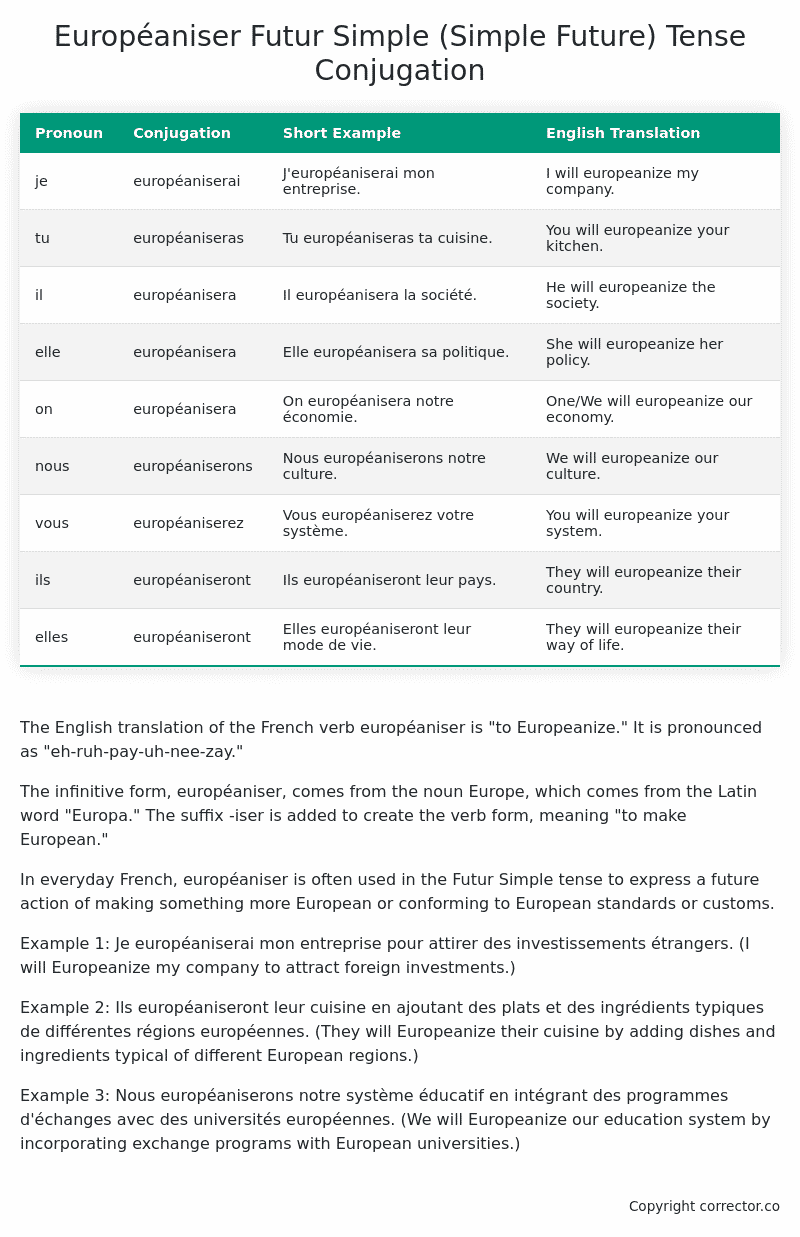Futur Simple (Simple Future) Tense Conjugation of the French Verb européaniser
Introduction to the verb européaniser
The English translation of the French verb européaniser is “to Europeanize.” It is pronounced as “eh-ruh-pay-uh-nee-zay.”
The infinitive form, européaniser, comes from the noun Europe, which comes from the Latin word “Europa.” The suffix -iser is added to create the verb form, meaning “to make European.”
In everyday French, européaniser is often used in the Futur Simple tense to express a future action of making something more European or conforming to European standards or customs.
Example 1: Je européaniserai mon entreprise pour attirer des investissements étrangers. (I will Europeanize my company to attract foreign investments.)
Example 2: Ils européaniseront leur cuisine en ajoutant des plats et des ingrédients typiques de différentes régions européennes. (They will Europeanize their cuisine by adding dishes and ingredients typical of different European regions.)
Example 3: Nous européaniserons notre système éducatif en intégrant des programmes d’échanges avec des universités européennes. (We will Europeanize our education system by incorporating exchange programs with European universities.)
Table of the Futur Simple (Simple Future) Tense Conjugation of européaniser
| Pronoun | Conjugation | Short Example | English Translation |
|---|---|---|---|
| je | européaniserai | J’européaniserai mon entreprise. | I will europeanize my company. |
| tu | européaniseras | Tu européaniseras ta cuisine. | You will europeanize your kitchen. |
| il | européanisera | Il européanisera la société. | He will europeanize the society. |
| elle | européanisera | Elle européanisera sa politique. | She will europeanize her policy. |
| on | européanisera | On européanisera notre économie. | One/We will europeanize our economy. |
| nous | européaniserons | Nous européaniserons notre culture. | We will europeanize our culture. |
| vous | européaniserez | Vous européaniserez votre système. | You will europeanize your system. |
| ils | européaniseront | Ils européaniseront leur pays. | They will europeanize their country. |
| elles | européaniseront | Elles européaniseront leur mode de vie. | They will europeanize their way of life. |
Other Conjugations for Européaniser.
Le Present (Present Tense) Conjugation of the French Verb européaniser
Imparfait (Imperfect) Tense Conjugation of the French Verb européaniser
Passé Simple (Simple Past) Tense Conjugation of the French Verb européaniser
Passé Composé (Present Perfect) Tense Conjugation of the French Verb européaniser
Futur Simple (Simple Future) Tense Conjugation of the French Verb européaniser (this article)
Futur Proche (Near Future) Tense Conjugation of the French Verb européaniser
Plus-que-parfait (Pluperfect) Tense Conjugation of the French Verb européaniser
Passé Antérieur (Past Anterior) Tense Conjugation of the French Verb européaniser
Futur Antérieur (Future Anterior) Tense Conjugation of the French Verb européaniser
Subjonctif Présent (Subjunctive Present) Tense Conjugation of the French Verb européaniser
Subjonctif Passé (Subjunctive Past) Tense Conjugation of the French Verb européaniser
Subjonctif Imparfait (Subjunctive Imperfect) Tense Conjugation of the French Verb européaniser
Conditionnel Présent (Conditional Present) Tense Conjugation of the French Verb européaniser
Conditionnel Passé (Conditional Past) Tense Conjugation of the French Verb européaniser
L’impératif Présent (Imperative Present) Tense Conjugation of the French Verb européaniser
L’infinitif Présent (Infinitive Present) Tense Conjugation of the French Verb européaniser
Struggling with French verbs or the language in general? Why not use our free French Grammar Checker – no registration required!
Get a FREE Download Study Sheet of this Conjugation 🔥
Simply right click the image below, click “save image” and get your free reference for the européaniser Futur Simple tense conjugation!

Européaniser – About the French Futur Simple (Simple Future) Tense
Formation of Futur Simple
For regular -er verbs (e.g., parler – to speak)
For regular -ir verbs (e.g., finir – to finish)
For regular -re verbs (e.g., vendre – to sell)
Common Everyday Usage Patterns
Conditional Statements
Interactions with Other Tenses
Futur Antérieur
Conditional
Present
Summary
I hope you enjoyed this article on the verb européaniser. Still in a learning mood? Check out another TOTALLY random French verb conjugation!


